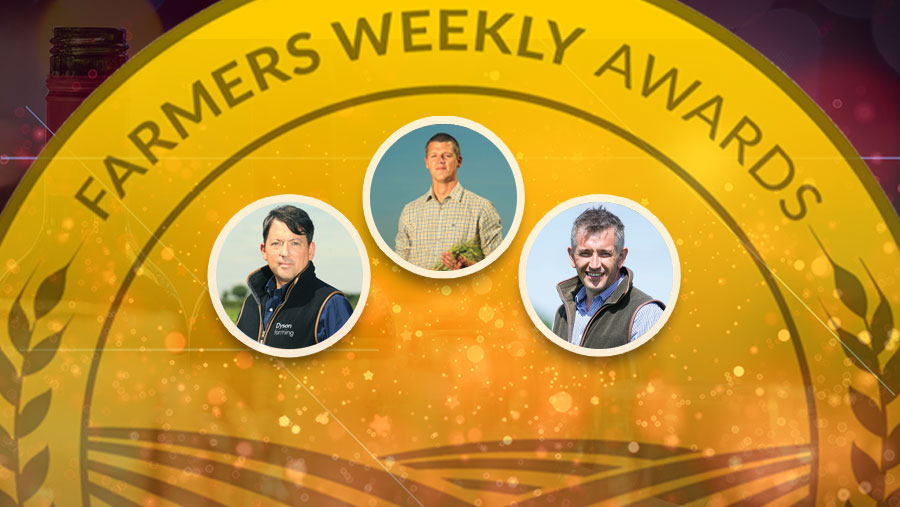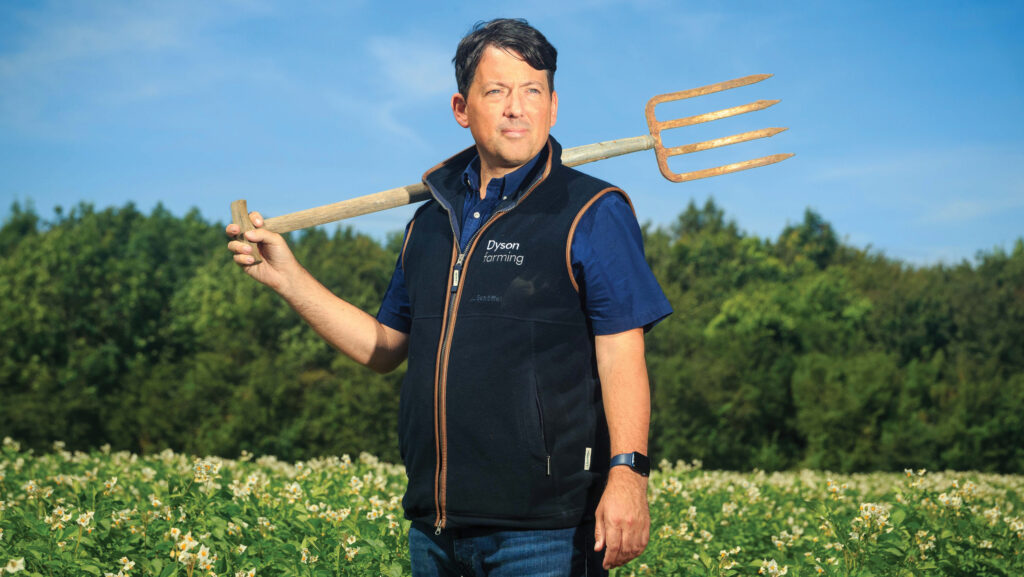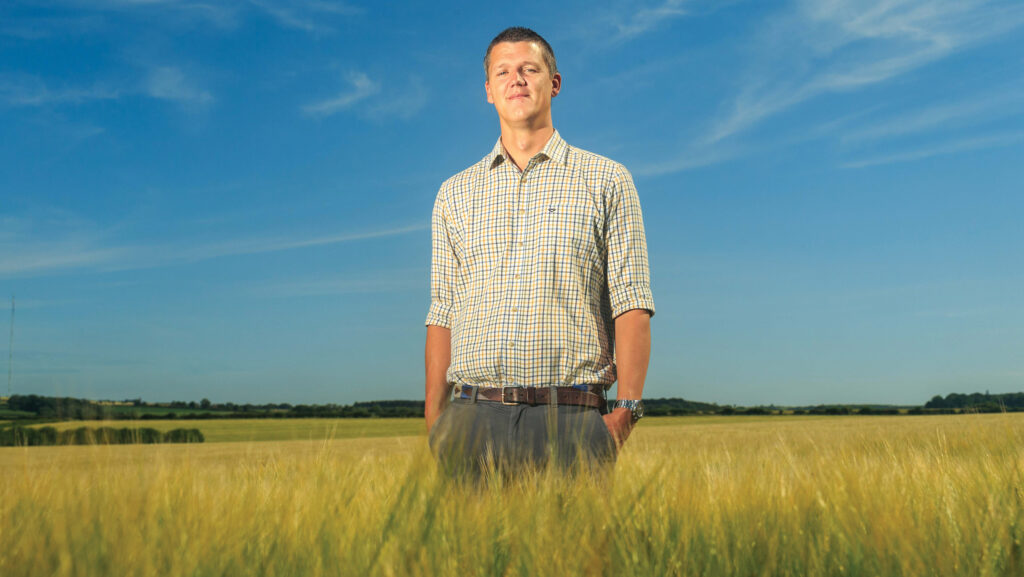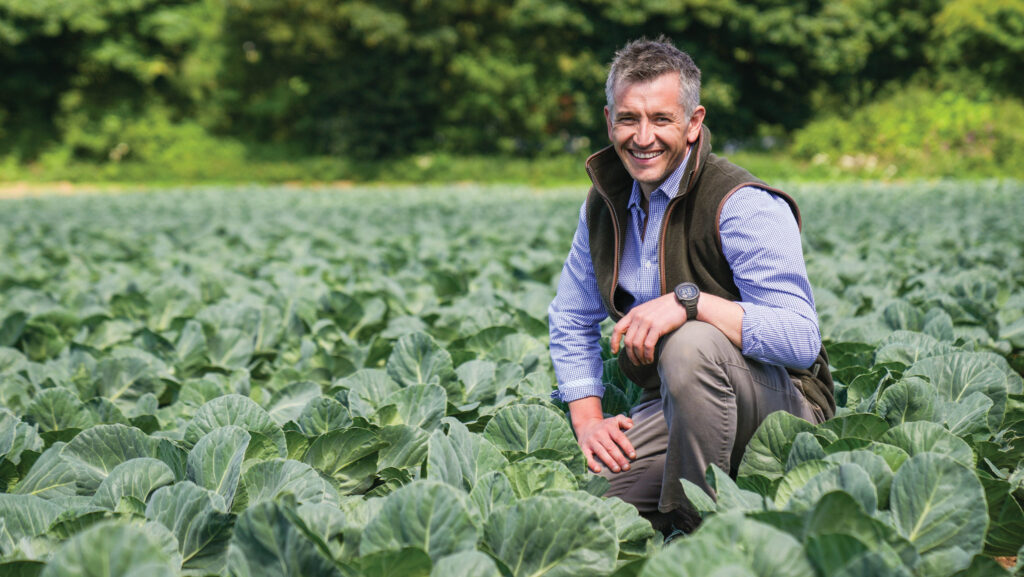Farmers Weekly Awards 2024: Arable Adviser of the Year finalists

Strong work ethic, attention to detail and a deep passion for agronomy are qualities shared by all three finalists.
Finalists
- Ben Abell, Dyson Farming, Lincolnshire
- Stuart McDowall, Agrii, Lincolnshire
- Richard Tresidder, Agrovista, Cornwall
The judges
- Edward Vipond: farms manager, Troston Farms – a business spanning 1,600ha growing a wide range of crops on different soil types in West Suffolk.
- Todd Jex: Farmers Weekly‘s 2023 Arable Adviser of the Year is an agronomist and Agrii national technical adviser for regenerative farming.
- Philip Case: Farmers Weekly chief reporter who worked on the Arable desk before joining the News team
Ben Abell, Dyson Farming, Lincolnshire

© Ben Abell
The Dyson business, managed by billionaire inventor Sir James Dyson, is excited about growing the future of sustainable agriculture.
“We want to be transformational and a force for good in UK agriculture,” says Ben Abell, who is keen to play a pivotal role in the company’s future.
Ben worked as an agronomist and farm trader for eight years at Frontier Agriculture and Agrii, before joining Dyson Farming full-time in September 2014.
He is now head of agronomy for Dyson Farming and responsible for managing a small, in-house team of three focused on agronomy, technology, precision agriculture, soils, and the Sustainable Farming Incentive (SFI).
Team effort
Ben and his team work closely with four farm managers across the sites, who are responsible for the day-to-day management of the Dyson farms.
Ben has full autonomy and responsibility for agronomy and inputs across the enterprises, which span 14,000ha of arable crops, root crops, vining peas and energy crops in Lincolnshire, Oxfordshire and Gloucestershire.
In his 10 years at Dyson Farming, Ben has built from scratch teams with expertise in agronomy, soil science and precision technology.
Under his direction, they have improved farmland through a focus on soils and the environment, creating much more resilient and profitable crops.
The long-term vision is for transformational and sustainable farming to create food products.
In the short term, Ben’s priority is reducing inputs, maximising outputs and cutting emissions for the business.
Technical expertise
Agronomy and technology play a huge part in the everyday running of the business across different farming systems.
Precision technology is at the heart of daily operations and data is used to make informed decisions.
For example, Ben and the team are using a Bilberry camera spot-spraying system to reduce inputs.
The use of a WhatsApp group and regular reports enables everyone in the Dyson farming team to stay updated and provide input, which helps to drive decision-making.
Ben and the team are using an in-house data platform system called Pioneer to share agronomy reports, harvest cropping and the “hall of shame”, which ranks fields in terms of their performance.
Ben is involved in digital transformation within the business, looking at the improved use of data for efficiency and productivity gains.
He works closely with Dyson Farming Research, an internal department focused on transformational and sustainable agriculture.
He advises on trials that aim to reduce inputs and maximise outputs, ranging from small plots to larger, landscape crops.
About 150 external farmer clients subscribe to the research service.
Ben is rightly proud of his achievements in farming.
Last year, he was selected for the Institute of Agricultural Management leadership development programme, a course which was great for his personal development.
“It really pulled you apart and rebuilt you back up again,” he says.
Ben has also been instrumental in helping Dyson Farming win back-to-back Adas Yield Enhancement Network (YEN) Gold and Silver awards for growing spring barley in 2022 and 2023.
The future
Ben is keen to develop his team to be a “force for good” in agriculture and help drive even more change in the sector through research and technology.
On a personal level, Ben plans to enhance his leadership skills and be a change-maker for the industry.
In numbers
- 10 years working at Dyson Farming
- 14,000ha area of arable crops, root crops and vining peas covered by agronomy advice
- 3,000ha of cover cropping managed
- 1,600ha of environmental stewardship features managed
Fact file
- Employee at Dyson Farming for 10 years, having previously worked at Frontier Agriculture and Agrii
- Adas Yen Gold and Silver award winner 2022 and 2023
- Board member for Future Biogas advisory board
- First class BSc Hons in Agri-food Production with Marketing and Management from Harper Adams University
Judges liked
- Link between Dyson Farm Research and ‘on-farm’ practice
- Attention to detail in a large-scale business
- Looking to add value to commodities whenever possible
- Wide range of crops being integrated into the farming system
- Developing systems for data collection and interrogation
What the judges say
Ben heads a very impressive agronomy team that serves the Dyson Farming business very well.
He has full autonomy and accountability to deliver advice o a wide range of crops across the agri-business and heads the buying group, ensuring the lowest cost base for inputs.
Stuart McDowall, Agrii, Lincolnshire

© Stuart McDowall
Agrii agronomist Stuart McDowall has built his client base through dedication, hard work and a sound understanding of farming systems.
Stuart, 34, has been an agronomist for 10 years, having previously worked on farms in various roles from a young age.
Starting out at Agrii in September 2014, he has built his client base to 26 agronomy customers, plus 14 additional over-the phone support customers.
He offers a comprehensive package of advice around all aspects of arable crop production, including supporting clients with record-keeping and up-to-date legislation, machinery decisions and drainage.
During the quieter periods of agronomy, Stuart likes to help his farming clients with their spraying, drilling, cultivations or combining.
Client rapport
Alongside manager Mark Popplewell, Stuart has played a pivotal role in transforming the 2,000ha Happy Days Farming business in Market Rasen, north Lincolnshire.
The Happy Days Farming business previously employed a mix of three agronomists from self-employed and distribution businesses.
But five years ago, it decided a change of direction was required and employed the services of Stuart.
A substantial investment in drainage on a 660ha block has resulted in more consistent crops across the farm, despite one of the most difficult weather patterns experienced over the last 12 months.
Previously, the farm relied on a wheat-rape-wheat-rape rotation, but with declining yields and increasing grassweed problems, Stuart has insisted on widening the rotation to include more break crops and spring cropping.
Using the Agrii Stow Longa traffic light system, fields rated red are left to spring cropping rather than first wheat. Those that are yellow or amber are not drilled before the end of October. Those that are green are drilled in the normal drilling window.
Stuart has also integrated Sustainable Farming Incentive (SFI) options into the business to help replace some lost income from the BPS.
Mark says: “Stuart’s career path shows that you can start out as a farmworker and develop your career into a pivotal role working with farming businesses in a large organisation like Agrii.”
Stuart’s knowledge of modern farm machinery and technology is hugely beneficial to complement his agronomy role, Mark adds.
Technical expertise
Stuart is trying to overcome the challenge of the past 18 months due to extreme periods of rainfall.
During last autumn, he helped Mark by taking the place of an absent member of staff, sitting on a drill until 4am to finish drilling a block of wheat ahead of the forecast 22mm of rain; in the end more than 100mm arrived.
This is a strong example of how the weather has made agronomy more challenging for Stuart this year.
In his battle against blackgrass, he is employing different cultural techniques, including delayed drilling, spring cropping and a focus on effective drainage and healthy soil structure.
“I treat my client’s crops as if they are my own,” says Stuart. “I believe that working to leave a viable margin is crucial for all farming businesses going forward.”
The future
Stuart says he feels indebted to Agrii for giving him the opportunity to train as an agronomist and says he could not see himself doing anything else or working for another company.
He says he does not want to lose the ability of driving modern farm machinery, adding: “You never know what the future holds.”
In numbers
- 26 agronomy customers
- 14 over-the-phone support customers
- 7,000ha covered
- 10 years working as an agronomist
Fact file
- Left school at 16 and worked his way up to main spraying man and combine driver on a 4,850ha farm before switch to agronomy
- Started working at Agrii in September 2014 as part of a succession plan covering 2,000ha, and has expanded own area to 7,000ha
- Since starting with Agrii, has achieved Basis diploma in Agronomy and Harper Adams graduate diploma in Agronomy with Environmental Management
Judges liked
- Dedication, hard work and commitment
- Willingness to get involved with all aspects of his clients’ farming businesses and go beyond that which one would normally expect
- Down-to-earth, practical approach
- Ability to see the bigger picture
What the judges say
Stuart has a very close relationship with his clients, giving them a no-nonsense approach to the advice he provides, in particular blackgrass control.
Stuart won’t compromise on standards and his commitment is clear to see, he will even drive the sprayer on occasions if needed.
Richard Tresidder, Agrovista, Cornwall

© Emily Fleur
I want to be the best agronomist in Cornwall, says Agrovista’s Richard Tresidder, admitting that might sound a bit clichéd to some.
With 200 farming clients located between Land’s End and Exeter, whom he visits every week, and a growing reputation for hard work and providing a high level of service, he is certainly going in the right direction.
Richard, 40, worked as a sprayer man for 15 years before his passion for crop agronomy developed.
He always held the belief that glyphosate and the plough made the farm, but he accepts that the world is changing and farming is becoming more complicated.
Richard adopts a very flexible approach because of the wide range of crops he works with, everything from grass and combinables, to brassicas, vegetables and potatoes.
Working on a wide range of soil types with a Cornish climate prone to rapid changes, he has to be adaptable and it requires a high level of attention to detail.
Client rapport
At 340ha Brew Farm, Land’s End, Richard has been working with farmer Adrian Semmens and his daughter Emma for the past three years since they made the radical decision to stop dairying due to market volatility and the significant investment necessary to make the business more efficient.
As part of a joint effort, Adrian has purchased a Sky Easydrill to help reduce reliance on ploughing, favouring min-till and some direct drilling.
Richard has also been instrumental in helping the family introduce Sustainable Farming Incentive (SFI) options on to the farm.
Daughter Emma says Richard has helped to move the farm from a paper-based recording system to a more up-to-date online one based around GreenLight.
The family rents out about 40ha of ground on a rotational basis to selected vegetable growers to grow parsnips, cauliflowers and potatoes. This helps achieve a sustainable rotation and give the Semmens a fresh start to autumn cereal production.
Adrian says: “Richard has proved to be an extremely valuable asset to our business. His diligence, regular crop walking, attention to detail, and sound advice has helped us greatly to move forward.”
Technical expertise
Richard has been working with his growers to try to overcome some of the issues they face, including wireworm in brassica crops. He has been experimenting with novel ways to control the pest.
As part of the work, pheromone traps have been used to catch the click beetle (adult wireworm). This forms part of the work Richard is involved in with a local brassica growers group, which he helped to set up.
As a result of a combination of location and weather, septoria pressure is Richard’s biggest challenge in wheat crops. This has prompted him to plan his own winter cereal septoria trials this autumn.
He also adds that although blackgrass has not found its way as far west as Land’s End, brome – and in particular meadow brome – is a real challenge, particularly given the large areas of barley being grown.
The future
Richard has no interest in moving away from his field-based role, nor has he any aspiration to move into management.
He does, however, admit he would prefer to spend less time on the road, having clocked up more than 80,000 miles since 2022.
In September, he will be mentoring a new joiner at Agrovista with a view to him taking on responsibility for some of his clients further afield.
In numbers
- 11 years as an agronomist
- 14 years as a sprayer operator before agronomy
- 200 farming clients
- 10,000ha of crop land covered as adviser
Fact file
- Left school at 16 for a 12-month YTS placement in agriculture
- Worked until 2014 on a traditional Cornish family farm growing potatoes, brassicas, cereals and grass
- Decided to go self-employed to self-fund Basis agronomy qualifications before joining Agrovista in 2015
- Basis and Facts-qualified agronomist, with additional qualifications in Basis Soil and Water and Basis Advanced Potatoes
Judges liked
- Relentless commitment to the cause
- Dedication to meet clients’ needs
- Hunger to finds ways to improve performance
- Professional approach
What the judges say
Richard has agronomy running through his veins, with a clear passion for the job, the commitment to more than 200 clients, no matter how big or small they are is impressive.
He has guided businesses through considerable enterprise change as dairy incomes decline in the area.
A word from our sponsor 
“NPZ UK is proud to sponsor this category, with three outstanding candidates all showing high levels of knowledge and professionalism in their respective roles, and in particular being adaptable to the challenging conditions faced. We wish them all the best of luck.”
Chris Guest, managing director, NPZ UK

